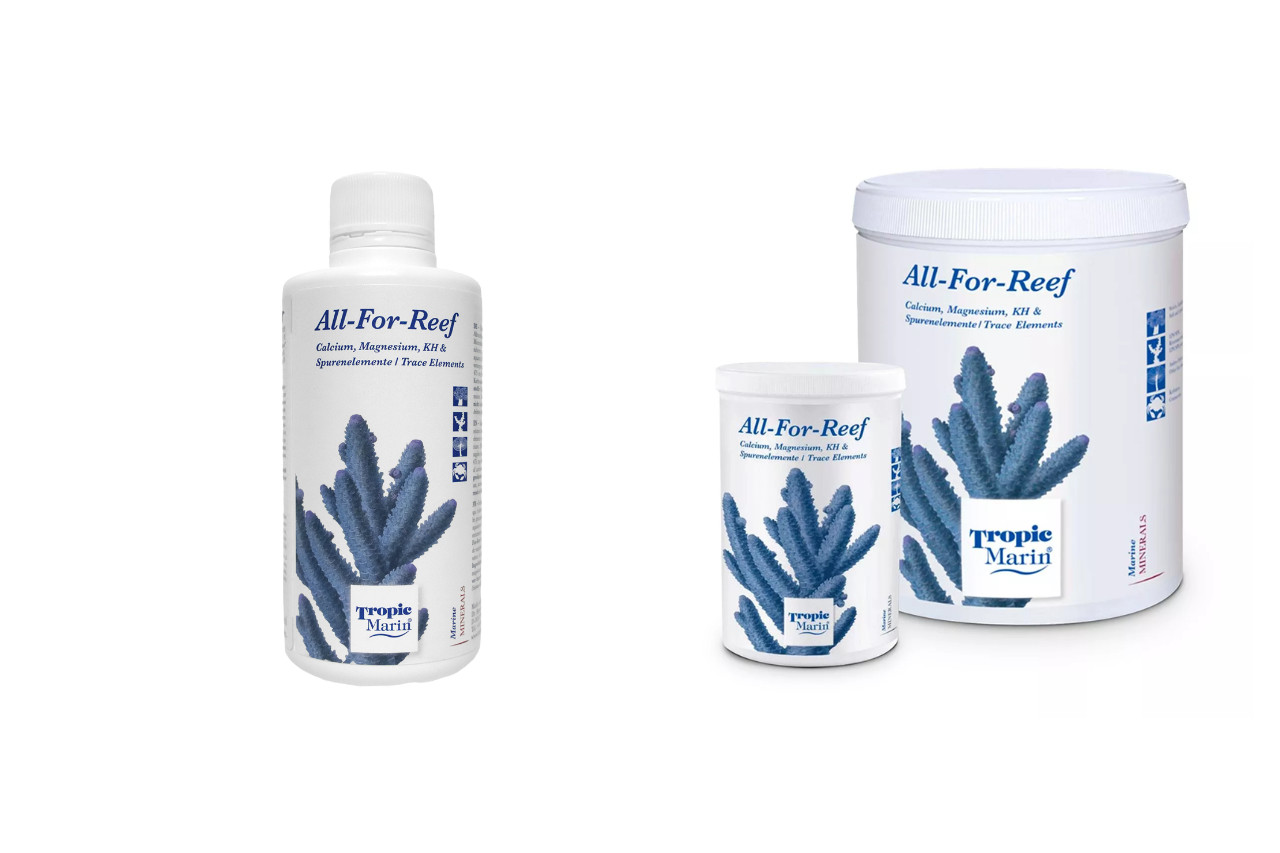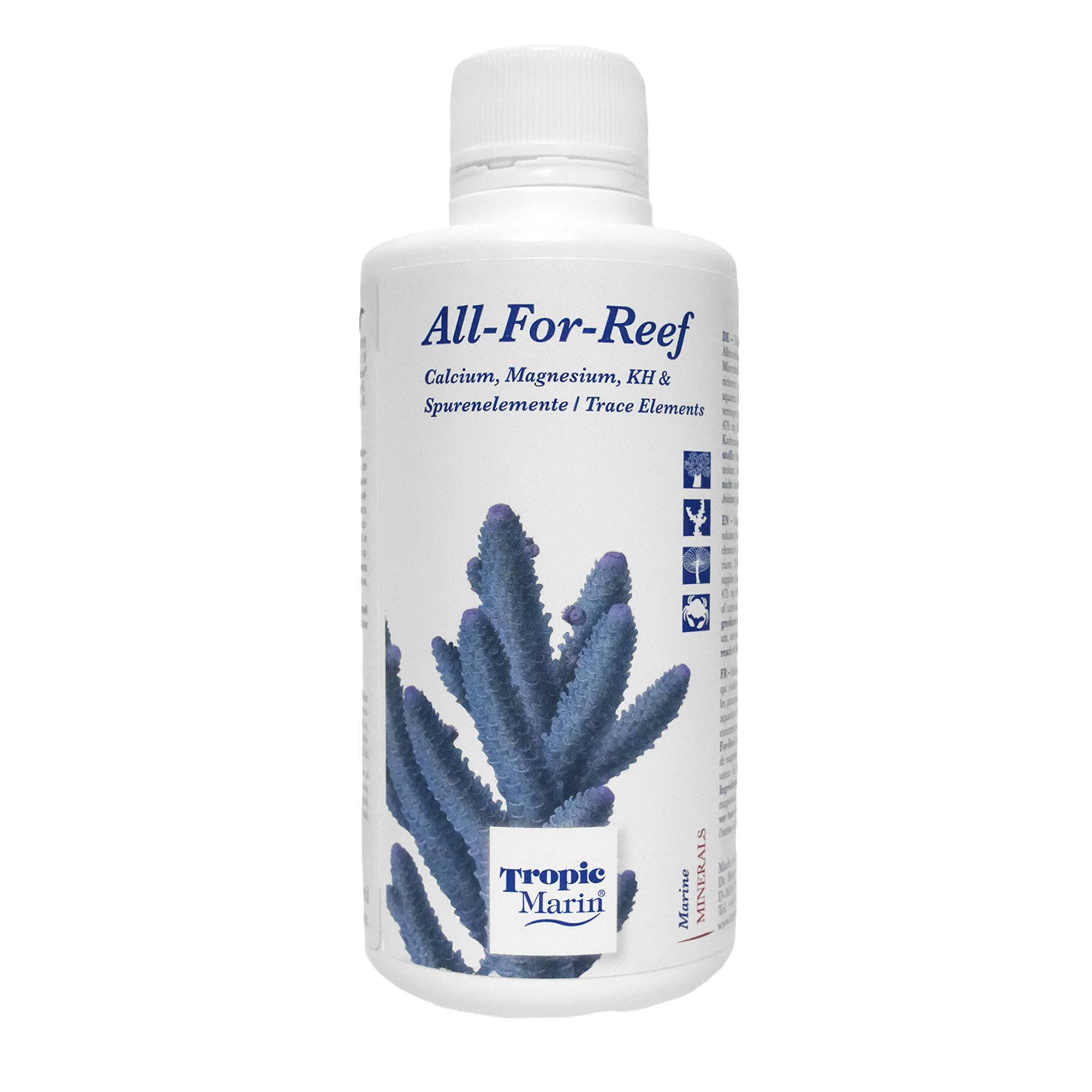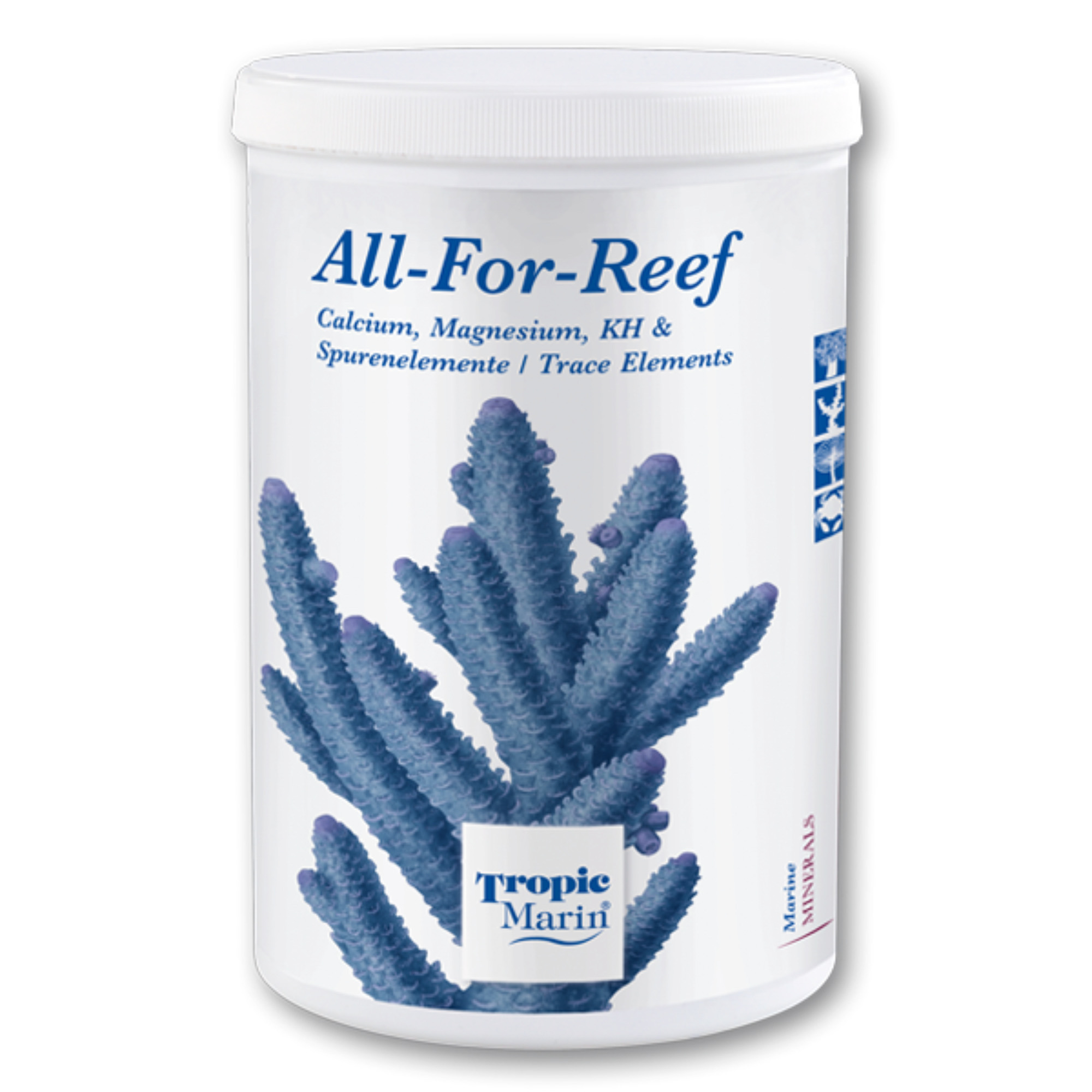All In on All-For-Reef

Sooner or later, most of us in the marine aquarium hobby will start to use reverse osmosis water for mixing our saltwater. It's a natural progression for us as we eliminate variables that can cause problems that are better avoided in the first place. Another progression is learning there is a difference between the consistency of high-quality salt, and the overly random nature of some of the cheaper salts on the market. In house, we only trust Tropic Marin for the salt we use in our entire system. Yes, you read that right, we only use Tropic Marin Synthetic Sea Salt for mixing the water in our holding system, our acclimation system and our packing tables. This is the only way for us to guarantee the stability and consistency of the environment we provide for our livestock.

The massive volume of this water and the consistency of the water changes means we don't need to do any dosing to our main systems. However, for those of us who choose to keep corals and clams in our personal aquariums, one of the next progressions we make is in dosing. Sooner or later, our home system's volume isn't big enough to maintain the parameters we want to keep stable with the consumption happening by the organisms within. If you have an aquarium full of corals and fish, it would be very expensive (and somewhat wasteful) to be doing the kind of water changes that would maintain the calcium, alkalinity and pH buffers that are getting used up as these organisms grow and produce waste, not to mention all the trace elements and alkaline metals that are getting consumed.
Instead of doing 75% water changes every week we often look to dosing and there are many ways to get this accomplished. One of the easiest, and frankly too often overlooked, ways to re-establish the captive conditions you need to make your corals thrive is Tropic Marin's All-For-Reef supplement. This will maintain (and help re-establish) the buffering capacity, alkalinity, calcium and other minerals and trace elements in an easy to use, one step process.
Stony corals are famous for their thirst for alkalinity and calcium, as they use these saltwater components for building their skeletons, but some healthy clams will drink these elements down faster. Even your soft corals, polyps, coralline algae and shelled invertebrates like crabs and shrimp utilize alk, ca, mg and a myriad of other things. Magnesium and strontium also get used quickly and are rarely tested for. In addition, trace elements like iodine, bromine, fluorine, are important components when it comes to building strength in coral skeletons. Selenium, iron, manganese, zinc, nickel, chromium cobalt, molybdenum, and vanadium are invaluable in the development of enzyme complexes and all of them get drawn down by the life in your tank. Even in heavily stocked tanks that don't have corals, the biological activity that is happening in the filter and live rock can be a drain on these elements. All-For-Reef contains all the elements that get depleted from seawater in a ratio specifically balanced for the captive aquarium environment. There are no fillers in the mix like salt (Sodium chloride) that can mess with your salinity or ion balance, and it will not form excess carbon dioxide in your system causing pH fluctuations.

The powder form of Tropic Marin All-For-Reef is super concentrated and is designed to be dissolved in reverse osmosis water before dosing. To prepare it, just add six level scoops (scoop included) to 900ml of reverse osmosis water. This should make a liter of solution. The 800g container will make 5 liters while the 1600g will make 10 liters (for reference, a liter is just over a quarter of a gallon.) All-For-Reef is also available as a premixed liquid, in 250ml, 500ml and 1000ml sizes for those of you who aren't interested in doing your own mixing.
When you start using All-For-Reef, we recommend that you establish the conditions you want in your aquarium first. You can start with a newly established aquarium or do a series of large water changes until you are testing at the pH, alkalinity, calcium and magnesium levels you are targeting. Conversely, you could make adjustments using the Tropic Marin Balling Salts, but using these is another article for another day. Once your system is balanced, then you can start dosing the All-For-Reef. Start with a daily dose of 5ml for every 100 liters of aquarium volume (which conveniently for Americans is basically the same as a tsp for every 25 gallons). Continue to test your water parameters weekly and if your alkalinity and calcium are still dropping, adjust the daily dosage by 2.5ml per 100 liters (half a teaspoon per 25 gallons of tank water). Regardless as to whether you mix your own, or buy the premixed liquid, these dosing recommendations are the same.Once you have the dosage you need worked out, along with your water change schedule, your system parameters should be stable. As your invertebrates mature over time the system will require higher dosing. Just keep monitoring your calcium or alkalinity (we recommend both, always, regardless of dosing or not). You'll see if you need to make adjustments to your dosing regimen this way. Dosing can be done by hand, and is fairly easy, but it can also be done using any number of dosing pumps on the market, which take all the guesswork and measuring error out of the equation. They are also nice for anyone who will be away from their tank for a few days, as you won't have to trust someone else to keep dosing for you.
It has been our experience that you'll never need more than a ml per gallon of tank water per day. Overdosing any combination of calcium and alkalinity of any kind, like two-part dosing or All-For-Reef, could cause a snowstorm, where calcium will precipitate out of solution, which is a water chemistry balance issue that is hard to recover from. If you are getting close to our maximum recommended dosage, double check your test kits before making increases. Most Local Aquarium Stores will happily test your water for you, and you can check their results against yours.
In our experience, there is no simpler, more effective way to dose everything you need to than All-For-Reef by Tropic Marin. In conjunction with their amazing sea salt, the vast majority of aquariums will only ever need regular water changes and dosing All-For-Reef for all of the chemistry aspect of keeping corals thriving. Of course, all corals will need light, flow and importantly food, but these are different articles! There are a few tanks out there that have slightly different demands and may need dosing with Balling Salts instead of, or in addition to the All-For-Reef, and we'll talk about those in a forth coming article. If you want your reef tank to thrive, head to your Local Fish Store and ask them about Tropic Marin All-For-Reef from Quality Marine today!
